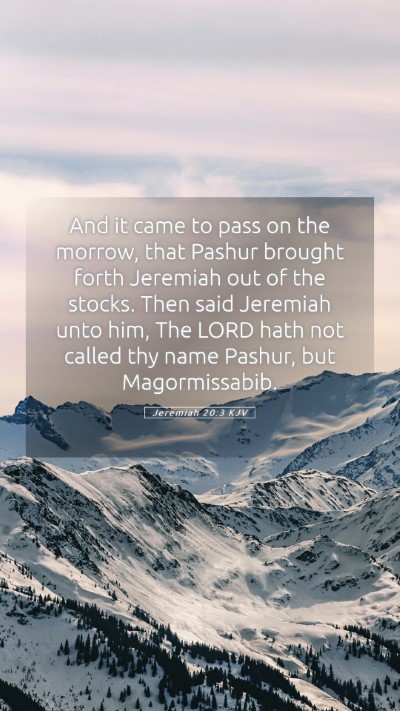Understanding Jeremiah 20:3 - A Comprehensive Analysis
Bible Verse: Jeremiah 20:3
Contextual Background: The Book of Jeremiah is a significant text in the Old Testament that chronicles the prophecies and experiences of the prophet Jeremiah, who is often regarded as the "weeping prophet." This verse presents a profound moment of personal anguish and conflict in the life of Jeremiah.
Verse Explanation: Jeremiah 20:3 states: "And it came to pass on the morrow, that Pashur brought forth Jeremiah out of the stocks. Then said Jeremiah unto him, The Lord hath not called thy name Pashur, but Magor-missabib." This verse reflects on the encounter between Jeremiah and the priest Pashur after Jeremiah was imprisoned for prophesying against the nation.
Meaning of Bible Verses: Insights from Public Domain Commentaries
-
Matthew Henry:
Henry emphasizes the strife between the false prophets and Jeremiah, illustrating the weight of public disapproval and the impact of God’s calling. He notes that Pashur’s imprisonment of Jeremiah reveals the rejection of God’s truth and the consequences that accompany faithfulness in prophetic duty.
-
Albert Barnes:
Barnes highlights the symbolic significance of the name changes presented in this verse. The name 'Pashur' means "a deliverer," but Jeremiah labels him 'Magor-missabib,' meaning "terror on every side." This stark contrast symbolizes the spiritual and social turmoil that Pashur would face due to his opposition to God's messenger.
-
Adam Clarke:
Clarke points out the emotional depth of Jeremiah's plight. He discusses the implications of being delivered from stocks and how it can reflect God's mercy even amid trials. Jeremiah's declaration against Pashur serves as a potent reminder of the serious spiritual realities that often lie behind human interactions.
In-Depth Bible Verse Analysis
This verse can be viewed through various lenses, including historical, prophetic, and personal aspects:
-
Historical Context:
Understanding the socio-political circumstances during Jeremiah's prophetic ministry can enrich comprehension. His warnings to Jerusalem about impending judgment came during a time when the people were largely engaged in idolatry and rebellion against God.
-
Prophetic Significance:
Jeremiah's words reflect the weightiness of God's message. Naming Pashur as 'Terror on every side' signifies the impending doom over those who oppose God’s will—an essential theme throughout the book of Jeremiah.
-
Personal Application:
On an individual level, Jeremiah's struggle can resonate with believers who feel isolated or persecuted for their faith. His courage despite such opposition serves as an inspiration in contemporary contexts of spiritual warfare.
Scripture Analysis: Related Cross References
- Jeremiah 1:19: A foretelling of the resistance Jeremiah would face from his own people.
- Jeremiah 15:10: Jeremiah laments his birth due to the scorn he faces for prophesying God’s judgment.
- Jeremiah 20:7-8: Jeremiah’s internal conflict regarding his prophetic ministry and the burden it carries.
The Importance of Understanding Scripture
In-depth study of verses like Jeremiah 20:3 can greatly enhance our understanding of Biblical themes such as prophecy, suffering, and the nature of God’s call. Engaging with Bible study groups and utilizing Bible study tools will provide additional insights that strengthen individual and communal faith journeys.
Conclusion
The examination of Jeremiah 20:3 serves as a vivid reminder of the cost of discipleship and the importance of standing firm in the truth of God, regardless of societal opposition. As believers seek to deepen their Bible verse understanding and engage with Scripture, let us look to the prophet Jeremiah as an example of faithfulness amid trials.


